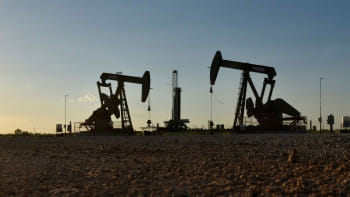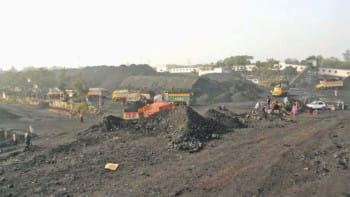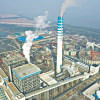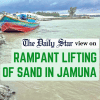Why open-pit coal mining in Phulbari will be disastrous

A plan to extract coal through open-pit mining in Phulbari and the northern part of Barapukuria coal mine area is being revived by the government, despite strong opposition by locals and environmentalists due to its devastating impact on agriculture, environment, and livelihoods. According to BBC Bangla, the ministry of power and energy will submit a proposal in this regard shortly at the highest level of the government for approval.
In fact, when coal power plants were being built one after another in the country, we expressed our concern that even though the carrot of cheap electricity generation using imported coal was shown to justify the projects, once the power plants are commissioned, it would be said that importing coal from abroad requires a lot of dollars, so local coal needs to be extracted. Unfortunately, this concern has now proved to be valid.
The interests of the private coal power plants, jointly owned by local and Chinese companies, in buying the locally mined coal is evident in a recent press release of GCM Plc (formerly Asia Energy), which has been trying to extract coal from Phulbari by open-pit mining since 2004 without any valid license. According to the GCM press release issued on March 11, the company has received Expressions of Interest (EOI) to purchase Phulbari's coal from two of Bangladesh's current independent power producers. One is SS Power Limited which operates the 1,320MW Banshkhali coal power plant and the other is Barisal Electric Power Company which operates a 350MW unit at Barisal. It is noteworthy that a Chinese state owned company named Power Construction Corporation of China, Ltd. ("PowerChina") has a stake in both of the two power plants and GCM has signed a contract with PowerChina covering mine development works of approximately $1 billion necessary to "facilitate coal extraction" at Phulbari.
Out of the 66.88 sq km land to be acquired for the open-pit mining project, 42.34 sq km is agricultural land. Once the topsoil of this vast amount of three-crop land is removed, the fertility built up over thousands of years will be lost.
But the people of Phulbari region already rejected open-pit mining in the mass protests of August 2006. The government also signed an agreement with the National Committee to Protect Oil, Gas, Mineral Resources and Ports mentioning that Asia Energy will be ousted from Bangladesh and no open-pit mining will be allowed in the country. The independent experts have written extensively about its potential disastrous impact, and even reports of various expert committees formed by the government have highlighted the dangers of open-pit mining.
First, the coal beds in the Phulbari-Barapukuria region are overlain by an 80-120 m thick Dupi Tila aquifer. To maintain dry working conditions in an open-pit mine, this aquifer will need to be dewatered. Due to mine dewatering activities, the water level will decline in varying depths in a large area, up to about 20 km radial distance from the centre of the mine, according to the expert committee report formed by the government in 2005 headed by professor Nurul Islam (Nurul Islam Committee Report, 2006, page 122). According to another expert committee report formed by the government in 2012 headed by Mosharraf Hossain, former chairman of Petrobangla, local tube-wells, shallow machines, and deep tube-wells will not get ground water for agriculture and domestic purposes within a radial distance up to 27 km from the centre of the mine (Mosharraf Committee report, 2012, page 51).
The coal bed of Bangladesh differs from that of many other places in the world, where the water table is found usually below the coal bed, not above as in Bangladesh. As a result, there is no need to dewater the entire area for coal extraction in other countries. The Musharraf Committee Report states in this respect that, "It is a fact that water is being controlled in other open-pit mines elsewhere in the world. But the geological condition could be different, the glaring example being that the Nayvali lignite in India is being worked by open-pit mining since long. But the water bearing strata there is below the lignite bed and not over the coal bed which is different condition than that of Bangladesh" (Mosharraf Committee report, 2012, page 40).
Secondly, for open-pit coal mining in Phulbari, at least 6,688 hectares (66.88 sq km) of land will be acquired, of which 5,428 hectares or 54.28 sq km of land will be used as mine footprint (EIA of Phulbari Coal Project, Chapter 7 of Volume 1, Page 49). As a result, a large number of people will have to be displaced and resettled. Asia Energy claimed in 2005 that in total 54,074 people from 12,312 households would have to be displaced and resettled. In reality, the number will be much higher and is estimated to be around 1 million in the 2012 Mosharraf Committee Report (Mosharraf Committee Report, 2012, page 30). Proper resettlement of this large number of displaced people in a densely populated country like Bangladesh is an almost impossible task.
Thirdly, out of the 66.88 sq km land to be acquired for the open-pit mining project, 42.34 sq km is agricultural land (EIA of Phulbari Coal Project, Chapter 7 of Volume 1, page 51). Once the topsoil of this vast amount of three-crop land is removed, the fertility built up over thousands of years will be lost. Of this, 1,946 hectares will be used for overburden dumping and another 696 hectares for reservoirs. So, in total, 2,642 hectares (26.4 sq km) of agricultural land will be permanently unavailable for crop production. Referring to this data, the Nurul Islam Committee Report commented that: "The damaged area of 26.4 square km is equal to the area of Dinajpur town. Such misuse of land is not desirable in a densely populated country like Bangladesh" (Nurul Islam Committee Report, 2006, pages 127-128). The report of the Musharraf Committee said, 3,000 hectares of land will be taken out of cultivation for the next 50 years (30 years for mining period plus 20 years reclamation, if it happens at all). As a consequence of destruction of agricultural land, fish, vegetables and fruits, Bangladesh will lose at least Tk 25,000 crore in the next 50 years (Mosharraf Committee report, 2012, page 50).
Fourthly, Phulbari coal mine project while destroying at least 1 lakh agricultural jobs (Mosharraf Committee report, 2012, page 50), will create employment for only 2,100 people during the mine construction period, and for 1,200 people in the long term of which very few will be available for the project affected people because coal mining requires specialised technical skills (EIA report, Chapter 9 of Volume 1, page 6).
Fifthly, laboratory testing of coal and overburden materials of Phulbari area indicates that there is a high risk for Acid Mine Drainage (AMD) formation in exposed Lower Dupi Tila Formation, weathered Permian waste rock, and coal seam material of Phulbari area (EIA, Chapter 7 of Volume 1, page 47). AMD occurs when the iron sulphides unearthed by mining activity interact with water and air and produce sulfuric acid, which can cause toxic metals to enter and eventually dissolve into the water. According to the EIA report, contamination of groundwater by AMD will have an impact upon terrestrial flora and any aquatic biota residing in water bodies connected to the aquifer; for example, the Little Jamuna River of Phulbari (EIA, Chapter 7 of Volume 1, page 33).
Although, as per the EIA, there will be mitigation measures to minimise the risk of AMD formation, the Nurul Islam committee expressed doubt about the effectiveness of such measures mentioning that, despite the presence of institutional and technical measures at the federal and state levels in a developed country like the USA, the impact of AMD could not be prevented there. Thousands of miles of rivers in various states of the USA have been polluted due to AMD (Nurul Islam Committee Report, 2006, page 123).
Therefore, there is no scope for doubt that open-pit coal mining in Phulbari and Barapukuria areas will cause serious social, economic, and environmental disasters. That's why it is important to ban open-pit coal mining in Bangladesh permanently and thus kill all kinds of lobbying activities in favour of it, once and for all.
Kallol Mustafa is an engineer and writer who focuses on power, energy, environment and development economics. He can be reached at [email protected]
Views expressed in this article are the author's own.
Follow The Daily Star Opinion on Facebook for the latest opinions, commentaries and analyses by experts and professionals. To contribute your article or letter to The Daily Star Opinion, see our guidelines for submission.

 For all latest news, follow The Daily Star's Google News channel.
For all latest news, follow The Daily Star's Google News channel. 











Comments